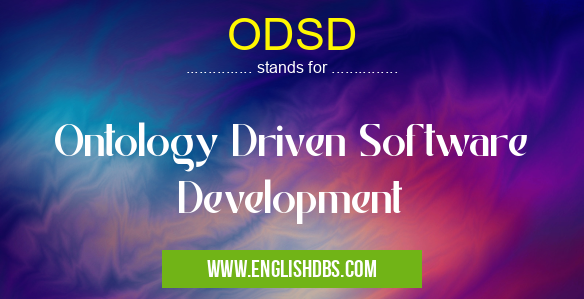What does ODSD mean in DEVELOPMENT
Ontology Driven Software Development (ODSD) is an approach to software development that takes into account the need to create systems with a structure that aligns with the terminology and concepts of the domain in which they are being used. ODSD provides an ontology-based framework for developing and managing software applications, using ontologies to provide semantic clarity and enforce consistency across distributed systems. It enables developers to use ontologies to define relationships between objects and data, allowing them to build solutions that are far more efficient and reliable than traditional approaches.

ODSD meaning in Development in Community
ODSD mostly used in an acronym Development in Category Community that means Ontology Driven Software Development
Shorthand: ODSD,
Full Form: Ontology Driven Software Development
For more information of "Ontology Driven Software Development", see the section below.
» Community » Development
What Is Ontology Driven Software Development?
Ontology driven software development is an approach that makes use of computer science principles such as abstraction, modularity, reusability and scalability. It leverages formal logic and semantics when designing software architectures. In addition, it relies on ontologies to model the real-world entities in the problem domain for which a system needs to be built. By making use of these formal representations, developers can create robust models which capture all relevant information from the problem domain in terms of objects, events, relationships etc., thus enabling a much more efficient development process. ODSD also makes use of modern technologies such as Semantic Web tools and Knowledge Representation Languages (KR languages) like RDF or OWL. This helps developers build highly flexible systems on top of existing knowledge bases or even create their own new ones using these KR languages. Furthermore, ODSD allows developers to define reusable models for building distributed applications which make maximum use of industry standard services like web APIs, SOAP/RESTful web services or other interoperable protocols.
Benefits Of ODSD
ODSD offers several advantages over traditional approaches — most notably speed and flexibility — by taking full advantage of modern technologies such as Semantic Web tools and KR languages like RDF/OWL. By eliminating the need for manual coding while creating applications with strong consistency across distributed environments, it reduces development time significantly while ensuring accuracy at every stage of the process. In addition, ODSD increases scalability because its designs are modularized — meaning they can be easily reused in different projects without needing significant changes — thus allowing developers to develop faster without having to start from scratch every time they embark on a new project. And by relying on rigorous semantic standards during design stages instead of just informal conventions between stakeholders as is often done in traditional approaches, it not only enhances compatibility but also guarantees data integrity across distributed systems where data needs to be shared among multiple users or entities.
Final Words:
Ontology driven software development offers several advantages over traditional approaches thanks largely to its reliance on formal techniques such as abstraction, modularity, reusability and scalability; modern technologies like Semantic Web tools; KR languages like RDF/OWL;and rigorous semantic standards during design stages instead of just informal conventions between stakeholders as commonly done in traditional approaches. As an outcome of this approach, businesses gain efficiency due to reduced development timelines while ensuring high levels of accuracy throughout the entire process leading towards stronger sustainability overall.
